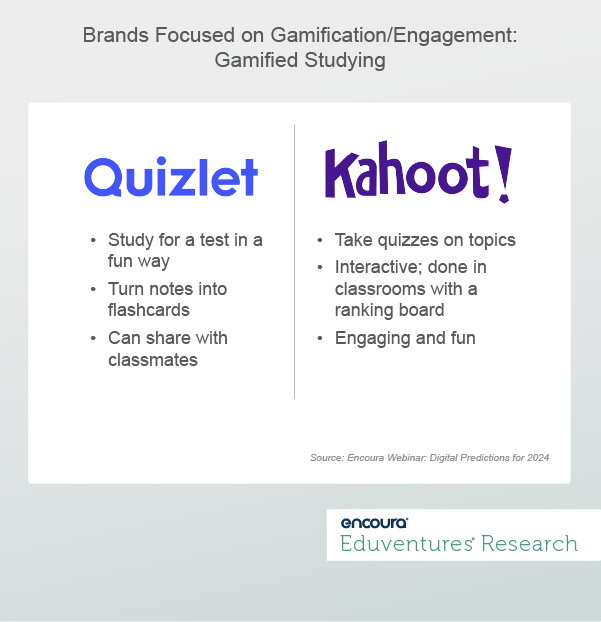They are spreading terror at Sephora cosmetics stores. They follow “influencers” like the Garza Crew who model indulgent consumer behavior on social media. They speak in a mysterious coded language—think “skibidi” and “rizz”—and bring new meaning to the word “Ohio.” Soon, they will be in your college pipeline.
We are talking, of course, about Generation Alpha.
In a previous post, we mined Eduventures’ data to predict what this rising generation may look for in a college. But what else is known about them? And how can we prepare to recruit them?
What We Know So Far
Generation Alpha, defined as those born between 2010 and 2024, is still very young, but marketers have eagerly begun examining their behaviors, values, and spending habits.
To start, like Gen Z, they are digital natives driven by strong values around social justice and sustainability. But they are also different in significant ways.
According to Northwestern University marketing professor Jim Lecinski, Alphas may look like Gen Z on paper, but their motivations and the ways they use technology differ. For instance:
- They create online content as much as they consume it (Gen Z mostly consumes).
- They use online gaming to connect with others, not just to escape (like Gen Z).
- They try to impact social change themselves rather than demand change from others (like Gen Z).
Here are three defining characteristics of Gen Alpha and how they may impact recruiting:
#1. It is the most diverse generation thus far.
Gen Alpha is more racially diverse than any generation before it. According to the U.S. Census in 2020, 69% of all U.S. children under 18 years old in 2016 were non-Hispanic Whites, which fell to 67% by 2020 (the tail-end of Gen Z). By 2030, when the first Alphas will enter adulthood, that proportion is predicted to further fall to 62%.
What we think it means for institutions: While Gen Z strongly advocates for social justice and equity, Gen Alpha students increasingly are those historically underserved students. This shifts the representation paradigm from an idealistic one to a pragmatic one.
During Gen Z’s college years, the college-bound population remained predominantly White. But with shifting demographics, institutions must recruit more historically underrepresented students to meet enrollment numbers. Additionally, the consumer research platform GWI reports that Generation Alpha is looking for representation and inclusivity in the media. When shopping for a college, you can be sure students will look for institutions that share their values.
#2. It is even more digital-forward than Gen Z.
Alphas spend more time on screens from an earlier age than Gen Z. According to Professor Lecinski, 43% of Alphas own a tablet before age six, and 58% own a smartphone by age 10. And they use technology differently than the generations before them. For example:
- Online gaming is an essential part of their social ecosystems, amplified by pandemic shutdowns. They use gaming to interact and build many significant personal relationships online, rather than using it as a way to escape.
- Gamified learning has widely permeated their classrooms and homework, with apps like ST Math and Lexia. Learning and playing, still separate concepts for Gen Z, blend together for Gen Alpha.
- Greater access to information at earlier ages than any other generation has also shaped Gen Alpha. They navigate tablets as toddlers, they use social platforms instead of search engines, and now, they have generative AI at their fingertips. They are adept at scanning many information sources, often using multiple screens at a time. But this ability may come at a price: these students may find it difficult to focus.
What we think it means for institutions: These students know where to find alternative, third-party information about institutions, which may increasingly lead them away from the preferred recruitment communication channels. To promote your institutional narrative, you will have to adapt your storytelling to the formats and channels this generation prefers, for example:
- Provide eye-catching, relevant “sound bites” of information, in short form video wherever possible.
- Connect them directly with current and former students online.
- Consider how to “gamify” tedious processes like application and enrollment processes.
Figure 1.
#3. It acquires brand awareness through influencers—and parents. Alpha kids have spending power, agency in family decision-making, and they learn about brands early. Their brand awareness comes from online influencers, but also, perhaps more importantly, from their—mostly Millennial—parents.
According to North Carolina State marketing professor Heather Dretsch, many Millennial parents indulge their children by buying high-quality—and expensive—products like Lululemon clothing or Apple iPhones, instilling a preference for high-end brands. And Alphas also show a preference for brands that find them where they are and create common experiences—like Nike’s venture into Roblox.
This is a departure from Gen Z, who is less brand loyal and prefers to shop around for the best value.
What we think it means for institutions: Greater brand awareness may shift the college value equation more toward brand equity vs. cost. Gen Alpha kids are becoming critical consumers, expecting high quality products that align with emerging values around equity and sustainability. They also show loyalty to consumer brands that can create meaningful, shared brand experiences.
Here are a few things you can do to strengthen your institution’s brand image for Gen Alpha:
- Bolster your family recruitment strategy. Parents will have even greater influence on Gen Alpha than Gen Z. Make sure parents and families have great experiences on your campus and a good perception of your brand.
- Systematically evaluate your brand strength—and how you communicate it to your market. Alphas mirror their parents’ brand preferences. The reputation of your institution will matter even more in years to come.
- Foster online brand ambassadors and influencers. Online influencers pick up where parents leave off. Help shape the conversation about your institution by working directly with your influencers, and don’t be afraid to give up creative control. Alphas will care more about authenticity than your carefully curated narrative.
The Bottom Line
While at first glance they resemble Gen Z, early insight into Gen Alphas suggests they are indeed different in terms of their behaviors, attitudes, and motivations. It might feel tempting for institutions to focus on the similarities between the generations and stay the course with current recruitment strategies, but this may prove to be a risky gamble as we enter a particularly tumultuous time for higher education.



